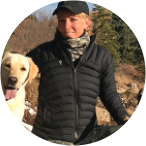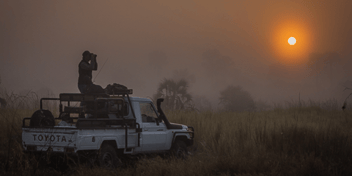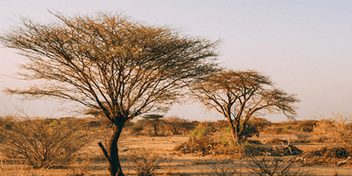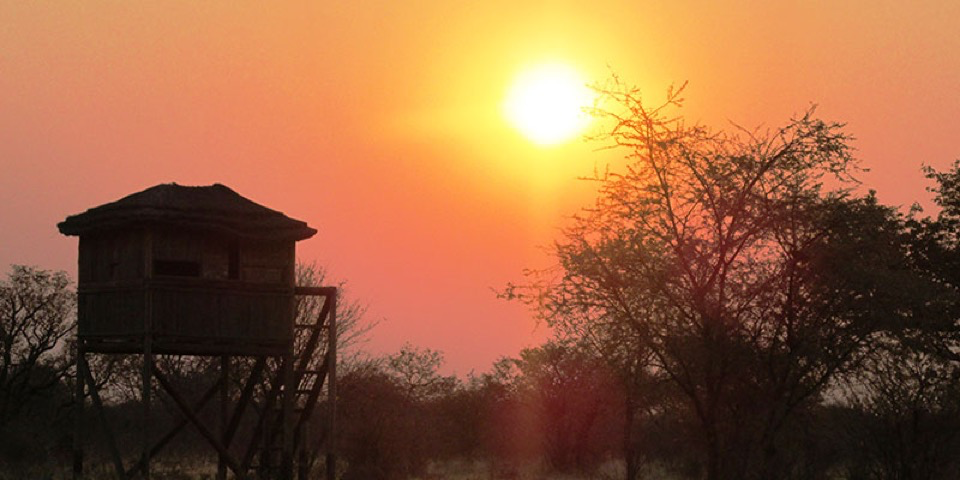
I never thought I would hunt in Africa… then it happened. Let’s just say, mind blown! The African adventure is something any hunter should throw on his or her bucket list. Although the hunting is amazing, the adventure doesn’t lie solely in hunting. Taking in the sights, sounds, and culture of the entire continent is just as exhilarating. But I digress...
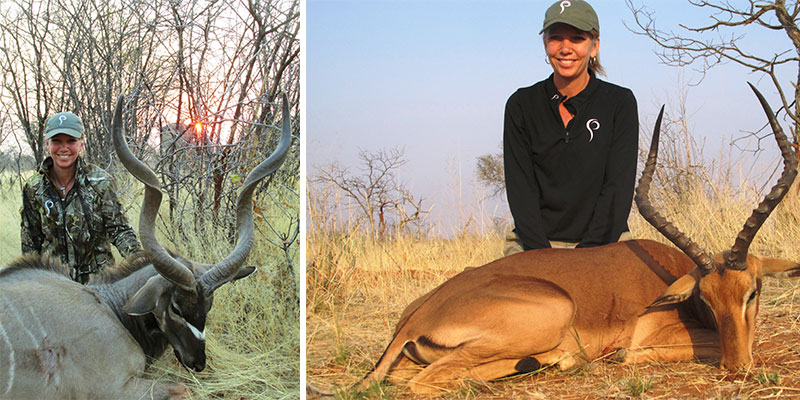
My first trip to Africa landed us in Namibia in 2014. While we prepared for this adventure by asking experts on African hunting like Diana Rupp, nothing can quite prepare you for the experience until you set foot on those ancient lands. I can’t lie, I was excited and terrified at the same time. We were thrilled to get to Namibia and start hunting with our friends at Mogwadiri Safaris.
Despite the excitement, my fears were based more on the unknown. We rented a car to extend our time in Namibia, but would we be safe doing so? How safe is it to be a woman traveling the roads and towns in Africa? What were important laws to know? Did we have all of the appropriate paperwork necessary? What were the unspoken cultural expectations? What about medical emergencies?
There are many things to take into consideration on travel to Africa. Especially if it is your first trip. I think we can all agree that safety and security are just as important as a phenomenal hunting experience. Through equal parts of good advice and poor decisions, I can safely say that there are true steps a hunter, female or male, can take to make that trip to Africa perfect.
- Start early with regards to ensuring all documents necessary to hunt and regain entry into the US are completed. Each country has different requirements, so do your homework. Plan early to do your CBP Form 4457 as it is not only necessary for re-entry to the US, but some countries also request to see this as proof of ownership of your firearms. Plan early as CBP officers must see the items you are registering to certify the certificate of registration. This can be done at an international airport if you have enough time before departure. I would recommend not doing this as it will add to stress and anxiety if time is tight. Find a US Customs agent near you and get this form completed and signed in advance. It will save you heartache and a bottle of TUMS in the long run. Complete the country-specific firearm permits as well. And have I mentioned doing your homework on firearm and ammo transport into Africa?
- Having been an ER nurse for 20 years, I inherently worry about illness and injury, especially in remote regions of the globe. If you do nothing else I suggest, doing this. Enroll in Global Rescue. This well-acclaimed rescue service provides emergency medical assistance and evacuation. The cost is nominal and provides great peace of mind. Keep all of your membership documents with you as you travel.
- Going back to my concerns for health and well-being, I recommend making an appointment with your family physician well in advance. Discuss the options to get prescriptions for antibiotics that can be utilized to treat gastrointestinal infections, urinary tract infections, and/or serious bacterial upper respiratory infections. Additionally, I travel with Phenergan for nausea and Imodium for diarrhea. It only takes one trip with the pukes to know you don’t want to do that again. Additionally, I recommend Benadryl and Ibuprofen. I take a labeled compartment tube of all of these medications any time I travel as it saves a lot of discomforts and finding an urgent care center isn’t always possible.
- Do early research as to what vaccinations may be required and whether or not you are entering a malaria zone. Pre-plan. If you live in a rural area, you may need to travel to larger cities for some vaccinations. If you must take quinine, make sure you take the quinine no matter how terrible it makes you feel.
- Do the research and get the international card for your cell phone. This could be a lifesaver. You can typically take care of this at the airport.
We rented a vehicle in Namibia and found our way to the lodge. However, our rental car broke down on the side of the road at dark 2 ½ hours from the outfitter and 2 ½ hours from Windhoek. This was extremely stressful. As mentioned in #4, thankfully we had cell service and could contact the outfitter and the rental car company. Conversely, the gentleman at the rental car company was extremely worried for our safety which only compounded our fears. While we were stranded at the side of the road for three hours, the gentleman at the rental car company called us about every half hour to ensure we were fine. Either he was seriously concerned or he felt it was a riotous joke to call and ask my husband if we were still alive. No lie. Everything worked out fine in the end, but if I were to do it again here are a couple of suggestions...
- Make sure you get a GPS with your rental vehicle. The maps can be difficult to decipher at times.
- Check-in advance as to what to do should you have a breakdown.
- Should you break down, we were instructed NOT to look as if we were stranded. Don’t use flashers. Don’t leave the hood of the vehicle open. Look as if you are intentionally parked.
- Be very aware of your surroundings and discuss a plan of action should you be met by some unsavory characters. I realized that except for my rifle, we were fairly helpless. I can’t lie here- I did appropriate a couple of sharp steak knives from the resort we stayed at after our hunt was over. They came in handy after my husband decided it was a good idea to pick up a hitchhiker. (I know… I was thinking the same thing- I just sat in the back seat staring at this young man’s jugular waiting for any suspicious move.)
So, following the aforementioned story…perhaps you shouldn’t pick up hitchhikers. Just saying...
- Should you experience a traffic violation, such as speeding, be prepared. (Yeah… this happened too…) You may be pulled over by an officer, and you will indeed need to pay a fine. You may be redirected to a town 50 miles away to pay this fine. Interestingly, sometimes you can simply ask the officer if you can pay the fine right there in cash. Did we get shaken down? Most likely. Did we have to travel 100 miles out of our way into a situation we didn’t understand?
- Take the time to explore the area's attractions. The game preserves are amazing. The local towns are somewhat intimidating at first, but once you learn where/how to park your car and become comfortable in the shops and grocery stores it is fun.
- Preparation for hunting in Africa is key. That said, over-packing will get you nowhere unless you are a glutton for punishment and love carting 25 lbs. of unnecessary objects across the world. If you desire this in your life, I won’t judge. However, I will address this in a future column.
- Flight preparation. The flights to Africa were by far the longest I had experienced. I could barely comprehend being on a plane this long. Here are my suggestions. Of course, wear comfortable clothing. South Africa Airlines provide hygiene kits which I thought were amazing. If your airline doesn’t provide this, pack toothbrush/toothpaste, contact lens supplies, wipes, and deodorant. Try to keep yourself awake for the first 8 hours. After that, a sleeping pill or Benadryl will help you sleep the remainder of the flight. Get up and walk. Wash up. Get comfortable. Pack a lightweight, clean outfit to change into once you arrive in Africa. You will feel like a zombie, but you don’t have to look and smell like one.
- Just as a random side note…hold on tightly to your plane ticket if you are boarding additional flights from the tarmac. I can neither confirm nor deny that my plane ticket blew away somewhere on the Johannesburg tarmac as I was attempting to board the flight to Namibia. While near hysterics did indeed endear me to the flight attendant at the door, I can attest to the fact that no amount of deodorant can help prepare you for that moment.
Clearly, I attend the school of hard knocks from time to time. However, these stories are now chuckle-worthy- for the most part!
ΩƒmaWith solid planning, your trip to Africa can all unfold smoothly, and with minimal stress and anxiety.
If you enjoyed this mini-tutorial, stay tuned for my upcoming eBook: Hunting Africa 101. It will include tips on getting gun permits; vaccinations needed; where to find specific species; and which Mossberg firearms you'll need to get the job done!
About the Author
